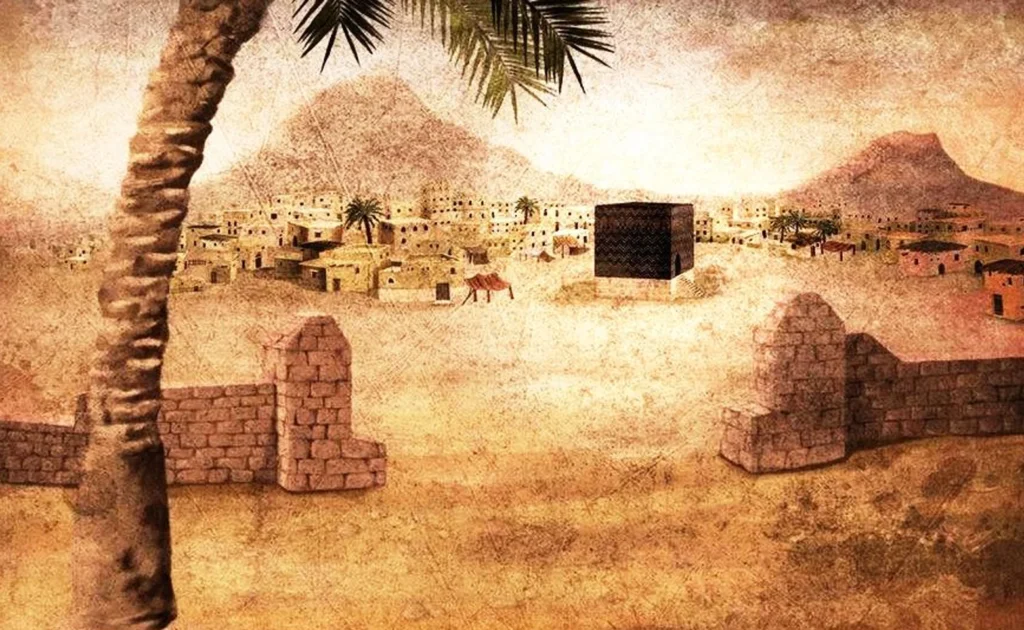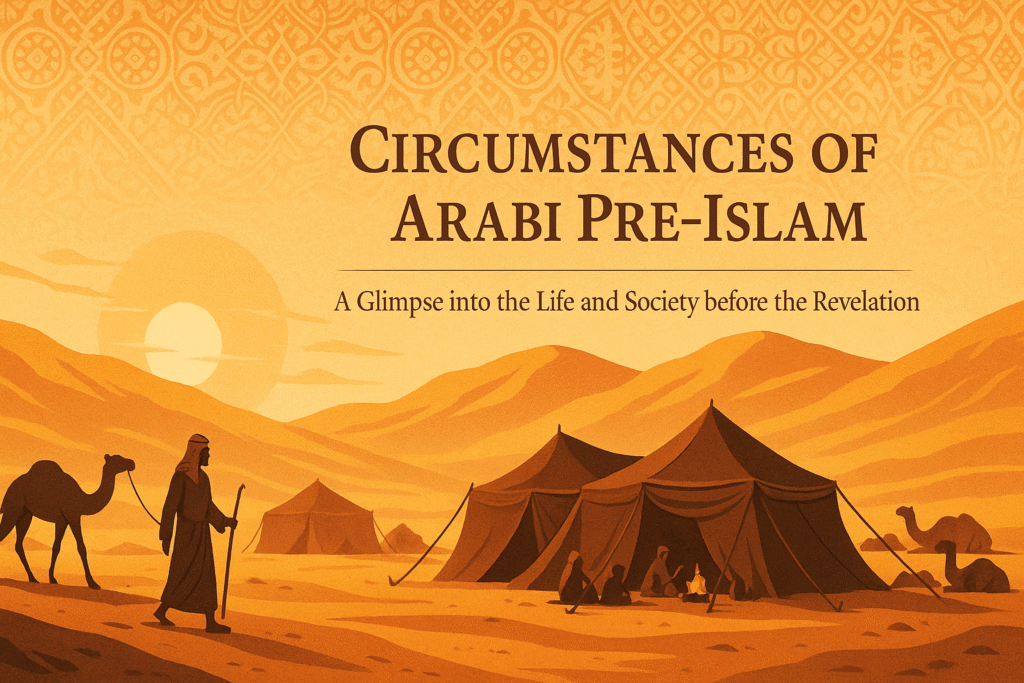Understanding Circumstances the state of Arabia and the greater world before the advent of Prophet Muhammad ﷺ (born 570 CE, the Year of the Elephant) is essential for appreciating the revolutionary nature of his message. This post delves into the political, social, economic, and religious conditions of 6th-century Arabia and its regional context, highlighting why this period set the stage for a transformative faith.
1. Political Landscape of Pre-Islamic Arabia
- Fragmented Tribal System: Arabia was not a unified state but a mosaic of tribes (e.g., Quraysh, Banu Tamim, Banu Hanifa). Loyalty to one’s tribe often superseded any broader sense of nationhood. Inter-tribal wars over water, grazing lands, and honor were frequent.
- Lack of Central Authority: Unlike the neighboring Byzantine and Sassanid empires, Arabia lacked a centralized administration or standing army. Leadership was localized, centered on tribal chieftains (shaykhs) whose authority rested on lineage and personal reputation.
- Periphery of Two Great Empires:
- Byzantine Empire (East Mediterranean): A Christian, Greek-speaking superpower, it exerted influence through trade and occasional military skirmishes in northern Arabia.
- Sassanid Empire (Persia): A Zoroastrian rival of Byzantium, it influenced eastern Arabia via Persian merchants and occasional border conflicts.
- Yemen and the Aksumites: In southern Arabia, the Aksumite Kingdom (modern-day Ethiopia and Yemen) held sway, especially in the fertile highlands. Christian kings from Aksum had deposed Yemen’s Himyarite rulers in the early 6th century, adding another external power to regional dynamics.
2. Social Conditions: Jahalat and Its Consequences
“Jahalat” (ignorance) describes the moral and social chaos about Circumstances of Arabia.
- Honor and Revenge Culture: A single murder could trigger cycles of blood vengeance lasting generations. Women and non-tribal members often served as pawns in securing alliances.
- Status of Women: Although some tribes respected women, female infanticide was practiced by others, driven by fears of economic burden or loss of honor.
- Slavery and Inequality: War captives and indebted individuals faced slavery. There was no concept of universal human rights; social mobility was minimal.
- Poetry and Oratory: Poets (shu‘arāʼ) like Imru’ al-Qays enjoyed celebrity status. Their verses shaped public opinion and tribal pride.
Did You Know? The Ka‘bah, long before Islam, was an important pilgrimage site for Arab tribes who came to perform rites and venerate tribal deities.
3. Economic Environment: Caravan Trade and Urban Hubs
Caravan Routes
- North–South Route: Linked Yemen’s ports (e.g., Aden) through Mecca and Medina up to Palmyra and Damascus, transporting incense, spices, precious stones, and textiles.
- East–West Route: Connected Persia and India to the Mediterranean, fostering Indo-Arab trade.
Oasis Towns & Ports
- Mecca: A key spiritual and commercial hub, administering the Ka‘bah and hosting annual fairs that drew pilgrims and merchants.
- Ta’if and Yathrib (Medina): Important agricultural centers, known for fruit gardens and date production.
Wealth Disparity
A small merchant elite—like the Quraysh—controlled caravan ventures. At the same time, the majority of the population lived with limited resources and no formal welfare system. there are the Circumstances of Arabia.
4. Religious Beliefs and Practices
- Polytheism: Over 360 idols in the Ka‘bah represented deities of various tribes. Rituals included animal sacrifice and pilgrimages tied to seasonal fairs.
- Hanif Monotheists: A small group (e.g., Waraqah ibn Nawfal, ‘Ubayd ibn Zayd) followed the pure monotheistic faith of Prophet Ibrahim (A.S.), rejecting idol worship but without a formal institution.
- Jewish and Christian Communities: Established in Yathrib (Medina), Najran (southern Arabia), and along trade routes—these communities maintained scriptures but had internal theological divisions.
- Superstition and Soothsayers: Astrology, reading entrails (falak), and tribal rituals shaped major decisions. Fear of jinn, evil eye, and omens guided daily life.

5. Wider World Context: Empires and Trade Routes
- Byzantine–Sassanid Rivalry: Their frequent border wars (e.g., Roman–Persian Wars) disrupted trade, pushing Arabian merchants to seek safer routes through the peninsula.
- Monsoon Sea Trade: Seasonal winds facilitated shipping between India’s Malabar Coast, the Arabian ports of Aden and Qana, and East Africa’s trading cities (e.g., Mombasa).
- Cultural Exchange: Along these routes, merchants and pilgrims exchanged languages, medical knowledge, and artisan techniques, laying groundwork for Islam’s rapid spread.
6. Why These Circumstances of Arabia Mattered
- Foundation for Unity: Tribal rivalries and lack of centralized power created a vacuum that Islam’s emphasis on ummah (community) would fill.
- Urgency of Social Reform: Injustice toward orphans, women, and the poor made the Qur’anic emphasis on compassion and equity deeply transformative.
- Rejection of Idolatry: Arabia’s entrenched polytheistic practices highlighted the boldness of Islam’s pure monotheism.
- Strategic Geography: Positioned at crossroads of land and sea routes, Arabia provided fertile ground for Islam’s message to reach three continents within decades.
Quote: “Indeed in the creation of the heavens and the earth and the alternation of the night and the day are signs for people of reason.” (Quran 3:190)
In this fractured world of tribal rivalries, social inequities, economic disparity, and spiritual confusion, Allah Subhanahu Wa Ta’ala, in His infinite wisdom and mercy, sent Prophet Muhammad ﷺ as the final Messenger to overcome these challenges. His mission unified the scattered tribes into a single ummah, abolished oppressive practices, and restored pure monotheism—offering a comprehensive framework for justice, compassion, and guidance applicable to all of humanity.
7. Bookmark This Series
Love learning about the life and legacy of Prophet Muhammad ﷺ? Bookmark this Seerat category to stay updated on each new installment. From his noble lineage to his final days, every lesson will deepen your connection with the Beloved Messenger of Allah—right here on Islam180.



